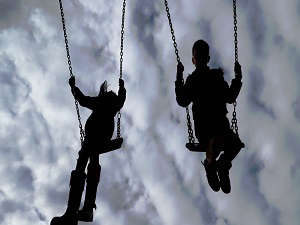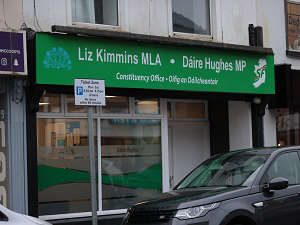
By Jonathan McCambridge (PA)
Six in 10 adults who took part in a groundbreaking study in Northern Ireland reported at least one traumatic event in their childhood.
Justice Minister Naomi Long said the results of the study into Adverse Childhood Experiences (ACEs) among the region’s adult population represent a major public health challenge.
Thirty per cent of respondents to the study reported suffering trauma specific to Northern Ireland’s Troubles, with a high number saying they had witnessed violence.
Ms Long said: “For the first time, the true extent of childhood trauma and its impact on all people in Northern Ireland has been documented and measured for all to see.”
The research, commissioned by the Executive Programme on Paramilitarism and Organised Crime, was led by a team from Queen’s University Belfast.
Ms Long said it revealed “significant levels of trauma that continue to impact all communities and across generations”.
She said: “The findings from this research are both striking and sobering.
“We now have crucial evidence of how childhood trauma shapes life outcomes in Northern Ireland.
“The findings show clear correlations between higher exposure to trauma in childhood and many negative outcomes, including poorer educational achievement, chronic health conditions like rheumatoid arthritis and chronic pain, increased exposure to domestic violence, addiction, poor mental health and health-harming behaviours.
“These are significant findings which will impact and inform policy and delivery across the Executive.”
Some of the main findings are:
– 60% of adults reported at least one ACE, and 17.6% experienced four or more ACEs.
– 30% reported conflict-specific adversities, including witnessing violence (47.5%), receiving paramilitary threats (12.2%), and conflict-related bereavement (8.7%).
– ACEs and Troubles/conflict-related adversities were disproportionately concentrated in deprived communities, highlighting socio-economic inequities.
Ms Long said: “That 60% of our adult population reports at least one traumatic childhood event, with nearly one in five experiencing four or more, represents a major public health challenge.
“More specifically, the finding that 30% of respondents reported conflict-specific adversities illuminates the unique context of trauma in Northern Ireland.
“Perhaps most concerning is the evidence that, despite being almost 27 years past the Good Friday Agreement, our younger generation continues to experience trauma linked to paramilitary activity.”
Dr Colm Walsh, an academic at Queen’s University Belfast who led the study, said: “What we see here is the long arm of early adversities, the impact of which extends beyond childhood, affecting a number of key outcomes, ranging from educational attainment, physical and mental health, substance use, and offending.
“Compared with those who report no ACEs, those who reported four or more were almost nine times more likely to be excluded from school as a child, eight times more likely to have been arrested, and three times more likely to have used illicit drugs in the previous year as an adult.”
The research was initiated following observations of high trauma levels among participants in the Executive Programme on Paramilitarism and Organised Crime.
Programme director Adele Brown said: “These findings underscore the critical importance of understanding and addressing childhood trauma in Northern Ireland.
“Twenty-seven years on from a historical peace agreement, our young people deserve a level playing field where inter-generational and domestic trauma doesn’t hold them back.
“They have the right not just to peace but a quality of peace.
“That means making sure that we all question the impact trauma could be having on our friends, family and colleagues and public services and learn how to respond effectively to it.
“This is much wider than specialist responses, this is about everyday interactions, too.
“We very much hope that the study’s findings will inform policy development and service provision across health, education, justice, and social services sectors in Northern Ireland.”
ACEs are defined as traumatic or stressful experiences that occur in childhood, including physical, sexual, emotional abuse, neglect, exposure to domestic abuse, parental separation, growing up in a household where there are adults with mental health or drug or alcohol problems or who have spent time in prison.
Researchers surveyed 1,200 participants from Northern Ireland, employing internationally recognised methodology.



 Thieves make off with ‘significant sum of cash’ from filling station ATM
Thieves make off with ‘significant sum of cash’ from filling station ATM
 Strike action by Northern Ireland nurses ‘imminent’, RCN warns
Strike action by Northern Ireland nurses ‘imminent’, RCN warns
 Attack on Sinn Fein office was ‘attack on democracy’, MP Hughes says
Attack on Sinn Fein office was ‘attack on democracy’, MP Hughes says
 Gun murder was planned assassination reminiscent of terrorist ambush,
Gun murder was planned assassination reminiscent of terrorist ambush,
 Storm Amy sparks school closures in Northern Ireland as Republic extends warning
Storm Amy sparks school closures in Northern Ireland as Republic extends warning